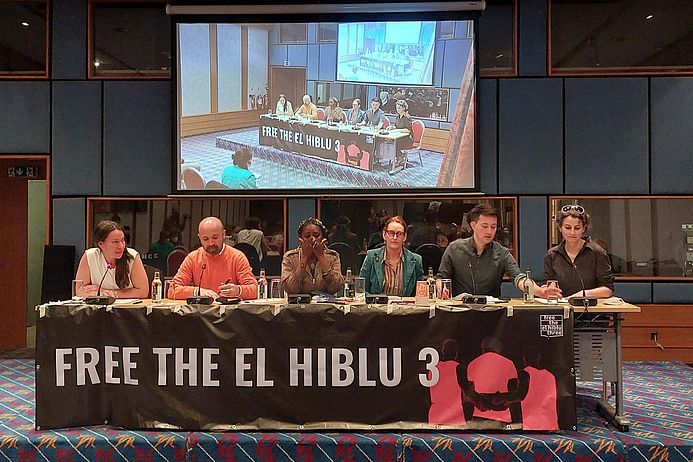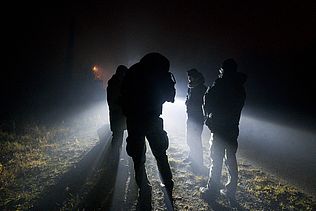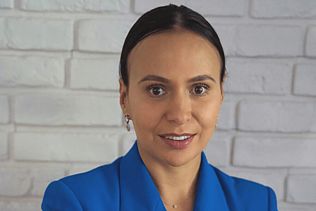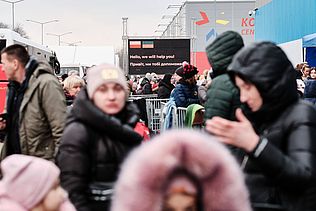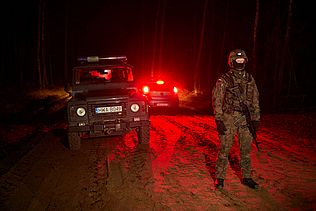Millions of Ukrainians are currently fleeing from war and neighbouring countries like Poland are receiving them with open arms and a lot of support. Most of the help is provided by the local civil society but also by volunteers and organisations from abroad. They distribute food, hygiene articles, power banks and organise shelter and medical care. At some border crossings, a veritable fair of humanitarian aid has developed. In front of camera teams from all over the world, NGOs and volunteers outbid each other in helping Ukrainians. The wide range of help from private individuals and activists is far less visible but also enormous. Overall, the wave of solidarity in Poland and other European countries towards refugees from Ukraine is overwhelming. However, it does not include everyone.
It is above all Ukrainian women and children who have been met with great hospitality. For other groups of refugees, the situation is much more difficult. Roma, Blacks and other People of Colour who are also fleeing the war in Ukraine often experience rejection. Men who desert from military service and cross the border illegally have a hard time, too. It is activists who support them, activist who have been caring for unwanted refugees in Poland long time before the war in Ukraine and despite increasing repression. They are also still caring for refugees from other war and crisis regions such as Iraq, Syria, Afghanistan, Jemen, Sudan or Somalia who got stuck in the forests along the Polish-Belarusian border. While the solidarity with Ukrainian refugees is overwhelming, a few hundred kilometres away in the Polish-Belarusian border area the worst human rights violations against refugees from other countries are taking place.
When I was there in November 2021, hundreds of refugees were crossing the border from Belarus into Poland every day, after Belarusian leader Alexander Lukashenko had encouraged them to enter the European Union via Minsk. In between Poland has started to erect a 186 kilometers long barrier at its border to Belarus which will be topped with barbed wire. For this and for other reasons, there are considerably fewer people crossing now, but the number of refugees trying to reach Poland from Belarus is on the rise again. Polish authorities said on Tuesday [22 of March 2022] that 134 people had attempted to cross the border over the previous 24 hours – a 'record this year'. (Infomigrant 23.3.2022). They came from counries like Afghanistan, Iraq, Egypt, Sudan, Yemen, Turkey and Cuba. On the Belarusian side, hundreds who have not yet been returned to their country of origin are still waiting for an opportunity to cross into Poland. Their situation is getting worse and worse. There are reports of systematic violence against refugees on the Belarusian side and there seems to be neither enough food nor medical care for them.
Those who have made it to Poland walk for days or weeks through the dense forest area without clean water and warm clothing, always in fear of being discovered and sent back. At least 19 people have died in the last months in the cold, wet and violent conditions of the border region. Many have experienced numerous pushbacks between Poland and Belarus in both directions. "They are hunted like animals," said one of the Polish activists we met there. The activists operate a kind of alarm phone to receive emergency calls from refugees wandering through the forest. Most people are in a very bad condition when they call. The activists supply them with tea, food and basic medical care. As far as mental injuries are concerned, they know that there is little they can do during their short encounters in the forest, and yet they take the opportunity to cheer people up a little – even if it is only a kind word or a careful touch.
While the support of refugees from Ukraine is welcomed by the Polish government, the support of people from other countries happens in an increasingly repressive environment. Since taking office in 2015, the PiS-led Polish government has adopted a hard line towards refugees. It not only started to errect the fence at the border but also prosecutes people who support unwanted refugees. According to Polish border guards only last week eight people – an Italian, three Ukrainians and four Polish nationals – were detained for helping refugees to cross the border from Belarus. They now face up to eight years imprisonment.
However, there is hardly any criticism of Poland's repressive policy from the EU and other European governments. On the contrary, despite the repression of critical civil society in the country and despite illegal pushbacks, as well as inadequate care and accommodation for refugees, EU governments never tire of emphasising their full solidarity with the Polish government in protecting the EU's external border.
In contrast to the EU's so-called "solidarity" with Poland in closing borders, activist initiatives such as the Grupa Granica or the Ocalenie Foundation, have been showing solidarity with people on the run for many years – no matter where they come from and where they want to go. They continue to document horrific human rights violations at the Polish-Belarussian border and provide psychological and legal assistance to the unwanted refugees in the forest and in the prison like detention centers of Poland, where many non-Ukranian refugees have to stay for months or even years in fear of deportation.
Also many people living in border regions are not willing to ignore the fact that refugees are starving and freezing right next to them and they do what they can to help them, like e.g. the residents of Michalowo, a small Polish town on the border with Belarus, who put green lights in their windows to signal hospitality.
A Polish activist sums up the brutality of the border regime that many people who support refugees face, she says: "We can't take people or drive them to a safe place. That would be a criminal act. But it is not a crime to leave these people to their slow death." And in face of the different treatment of people at the Ukrainian and the Belarusian border another one said: "It’s like there are two different countries in one, two totally different set of rules – people whose lives are worth saving and those who can die in the forest." And yet another one wrote a few days ago on twitter: "Many activists who have been working in the forests of [the Polish-Belarussian border region] for 7 months have gone to the Polish-Ukrainian border to help ... [because] there it is finally safe to help."
We live in a world where not only many groups of refugees are criminalised and unable to travel safely. Also, those who help them have to fear criminal prosecution. Since it is primarily refugees who help each other, it is them who are at risk of manyfold criminalisations. Like the ElHiblu3. The three of them did the only right thing in a desperate situation. They risked themselves to save people from torture and misery. In doing so, they have deeply shamed the European Union that has been letting people drown in the Mediterranean for years and now also lets them freeze or be beaten to death in Polish forests. The EU should take an example from the ElHiblu3 instead of persecuting them. What they deserve is awards and recognition, not prosecution.
Full solidarity with the ElHiblu 3 and with all those who support each other in desperate situations.

